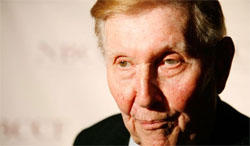He was still an undergraduate college student when he began a three-year stint as an Army codebreaker, working to decipher the secret messages of the Japanese high command. That was in 1943.
Today, at age 85, Sumner Redstone sits on an array of high-powered communications and entertainment companies that include Viacom, National Amusements Inc., CBS Corporation, publishing house Simon & Schuster, Paramount Pictures, DreamWorks Studios (co-founded by Steven Spielberg), MTV and Nickelodeon, among many others.
My time in the Army wasn't like your typical war movie. But it was the most demanding, exciting desk job that I could have imagined. For three years, I helped break the war codes whose deciphering played a major role in defeating Japan.
We labored in a set of stark, cluttered offices in a purposely nondescript complex in Arlington, Virginia, a few miles from the Pentagon, which had just been completed. The secrecy was unprecedented, rivaled only by the security that later surrounded the Manhattan Project.
To our friends and families, we had been assigned jobs in the Army Signal Corps. In fact, we were part of the "Special Branch Military Intelligence," a unit of military intelligence that only a handful of outsiders knew existed. Our own communications went only to other members of the code-breaking unit or to President Roosevelt.
Our work was intense -- long, plodding days (and frequently nights) trying to make some sense out of never-ending pages of four-digit numbers, figuring out what they meant in Japanese, translating them into English and deciding whether they had any significance for U.S. war planners.
Whenever we got hold of a codebook -- occasionally discovered when American troops overran some Japanese troops or when our Navy ships picked up Japanese survivors -- we'd work two or three days and nights trying to apply it to what we'd gleaned elsewhere. The first word we deciphered was maru -- Japanese for ship.
Our codebreaking mission was considered impossible. Codes of this kind had never been broken before -- in English, let alone in Japanese. The notion was so fantastic that when a Chicago newspaper printed a story about our group, the Japanese discounted it. Fortunately for us.
The Navy had assembled a similar team in Hawaii, headed by Commander Joseph J. Rochefort, a linguist and cryptologist specializing in Japanese. Together, the two teams made up the nucleus of what later would become the National Security Agency, the nation's premier codebreaking and eavesdropping organization.
The wartime impact was enormous. The fact that we were able to intercept and understand Japanese message traffic gave our strategists and our military commanders a tremendous advantage. We could tell them, for example, that a certain fleet would be at a certain place, and when.
One of the major factors in the U.S. victory in the Battle of Midway -- an event that occurred before my service, but which many regard as the turning point in the Pacific War -- was that our Navy knew where the Japanese fleet would be. By the end of the war, we had cleared the skies of Japanese air power. And the entire Japanese fleet had been sunk.
For us, the payback was immediate. Often we would pass along information about Japanese naval operations; three days later, we'd read in the newspapers that their ships had been sunk. Or we'd read Japanese message traffic, saying one of their army units had been overwhelmed.

|
As incredible as it may seem today, none of the codebreakers with whom we served was Japanese-American, who would have been able to give us the benefit of their familiarity with the language and with Japanese customs. The tenor of the times forbade that.
As so often occurred during the war, I'd gotten my assignment by happenstance. I was a student at Harvard, and I'd already had an extensive background in languages. I'd taken Latin and Greek for years, and could speak French and Spanish. I also was in the Army Reserve.
When the war broke out, they asked me to take a special nine-month class in Japanese. The instructor was an associate professor named Edwin O. Reischauer, who would become U.S. ambassador to Japan in the early 1960s. When he went to Washington -- actually, to Arlington -- I went along.
We spent our first six months in Arlington waiting for the government to complete our security investigations. We slept in a firehouse while the FBI did our background checks, which were extensive. They asked everybody we knew about us -- our families, our teachers, our friends.
Once we began working as codebreakers, none of us was permitted to leave the post. Our work was highly classified and couldn't be interrupted. So they set up an officer's school on-site. Although I had no formal military training, I did well and even surprised them by knowing what a 77-mm shell weighed -- a leftover from the Army Reserve.
I spent much of my war years as a T-5 (technician fifth grade, equivalent to a corporal) and ended my service as a first lieutenant. When peace came, I took off my uniform, packed up my medals and commendations, finished my degree and began my civilian career. I was 24 years old.
I know that even for those of us who served only briefly, the military can be a molding experience. People who have been in combat often tell you that it altered their lives. Some soldiers or sailors say the service opened up a new world for them -- pushed them into a new career.
In my case, the impact was constrained by the fact that I wasn't able to talk about what I did, even to my family and close friends. We were sworn to such strict secrecy that I had to put my wartime experiences aside. Eventually the overall story became public, though not the details.
But there's no doubt that my days as a codebreaker had their effect, reinforcing values that I'd already begun to realize were key to success anywhere you go. I learned that you have to be tenacious -- even relentless -- and you can't be deterred by obstacles. I've held these beliefs all my life.
I suspect my fellow codebreakers have as well. Over the years, I've been in touch with a few of them. One went on to become the dean of a well-known law school. Another is a professor at an Ivy League college. A third was a senior Justice Department official. All have shared these traits.
Today, as chairman of National Amusements Inc. and chairman of CBS Corporation and of Viacom -- companies that include well-known businesses such as MTV Networks, Simon & Schuster and Paramount Pictures -- I don't have the opportunity to use much Japanese. Though it doesn't come close to what it was during the war, I can still speak a little of the language.
Like my ability to speak Japanese, my experiences as a codebreaker have remained etched in my memory more than six decades after I returned to civilian life. It was an important and defining time for me and for many young people of my generation. I'm proud of my contributions to the war effort and grateful that I had an opportunity to serve.
I did make an unexpected splash earlier this year when, visiting Japan, I spoke Japanese as part of a speech I gave to our local employees. A television crew that was there to cover my talk caught the surprised and delighted reaction of the employees, few if any of whom knew of my background. That speech was a much easier assignment. I didn't have to break any codes.
Answering the Call is a monthly series of short articles by prominent men and women discussing the impact of their time in the military on their later lives.
Want to Know More About the Military?
Be sure to get the latest news about the U.S. military, as well as critical info about how to join and all the benefits of service. Subscribe to Military.com and receive customized updates delivered straight to your inbox.















